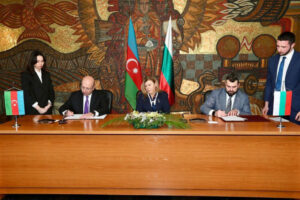Bulgaria Pledges Strategic Role in Ukraine’s Reconstruction Through Infrastructure and Regional Connectivity

Rome, The Gulf Observer: Bulgarian Prime Minister Rosen Zhelyazkov has reaffirmed Bulgaria’s commitment to playing a significant role in Ukraine’s long-term reconstruction, emphasizing large-scale infrastructure projects as essential to restoring connectivity and ensuring regional security in Eastern Europe.
Speaking at the International Conference on Ukraine’s Reconstruction in Rome, Zhelyazkov stated that rebuilding Ukraine will require investments exceeding half a trillion euros over the next decade—more than three times the country’s current GDP. He emphasized that this unprecedented effort presents opportunities for both Bulgarian businesses and the state to engage in strategic initiatives with lasting impact.
“Reconstruction will demand more than money—it will require foresight, coordination, and long-term commitment to building connectivity that serves the entire region,” Zhelyazkov said.
Bulgaria’s Strategic Role in the Black Sea Region
Zhelyazkov underlined Bulgaria’s vital geostrategic position in the Black Sea region, alongside Romania, Turkey, and Georgia—countries that currently form the backbone of EU and NATO security infrastructure in the area. He cited the importance of cross-border capabilities in electricity transmission, gas transit, and data flow, calling the Black Sea a “primary bridge to Asia.”
“This is not just about physical infrastructure, but digital and energy corridors that secure the region’s future,” he added.
Key Corridors and EU-NATO Priorities
A central project highlighted was the proposed Alexandroupolis–Odesa railway corridor, which would connect Greece, Bulgaria, Romania, and Ukraine. The corridor, designated as a priority project, aligns with commitments made during the recent NATO summit in The Hague, where members pledged 1.5% of GDP for defense and resilience investments.
In addition, Zhelyazkov emphasized the need to expand the Vertical Gas Corridor running from Greece through Bulgaria and Romania to Ukraine, noting Ukraine’s significant gas storage capacity. Strengthening this energy infrastructure, he argued, would not only enhance Ukraine’s stability but also reinforce regional energy security for Europe.
Dual-Use Infrastructure and Regional Cooperation
The Bulgarian Prime Minister also stressed the importance of dual-use infrastructure—projects designed for both civilian and military mobility, in line with NATO standards. He confirmed ongoing discussions with Greece, Romania, and Turkey regarding coordinated efforts in infrastructure development under NATO and EU frameworks.
Zhelyazkov pointed to recent agreements such as the construction of a third bridge over the Danube with Romania as examples of successful regional cooperation that could be replicated.
“There are many interlinked projects that can be realized in this context, which will benefit not only Ukraine, but also Bulgaria and the entire region,” he concluded.


